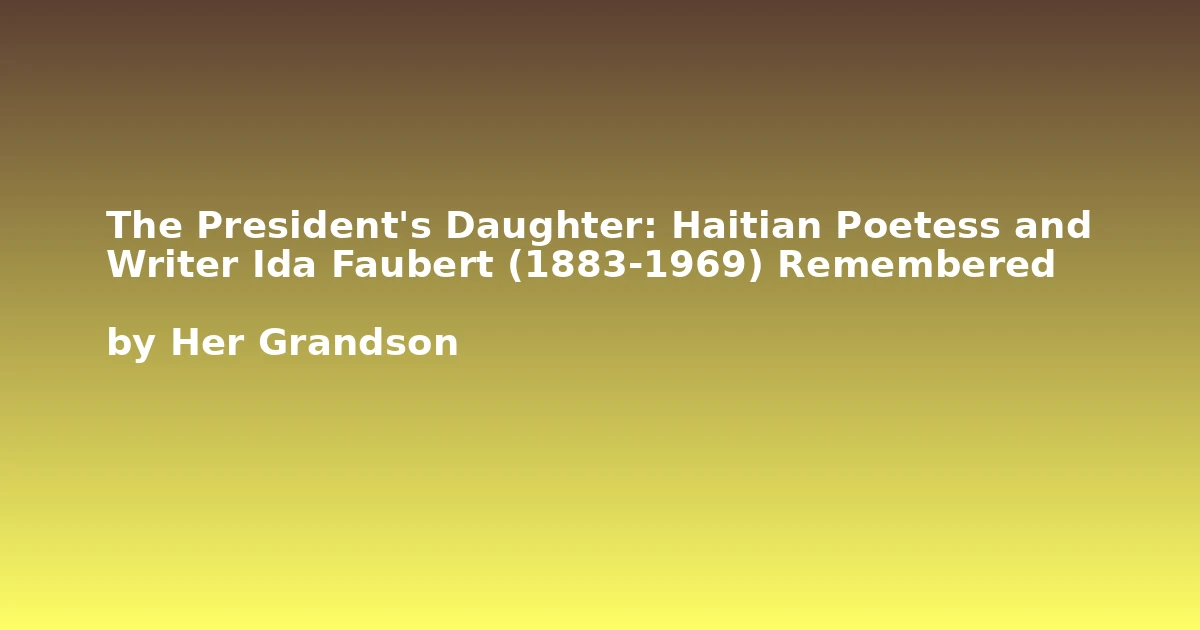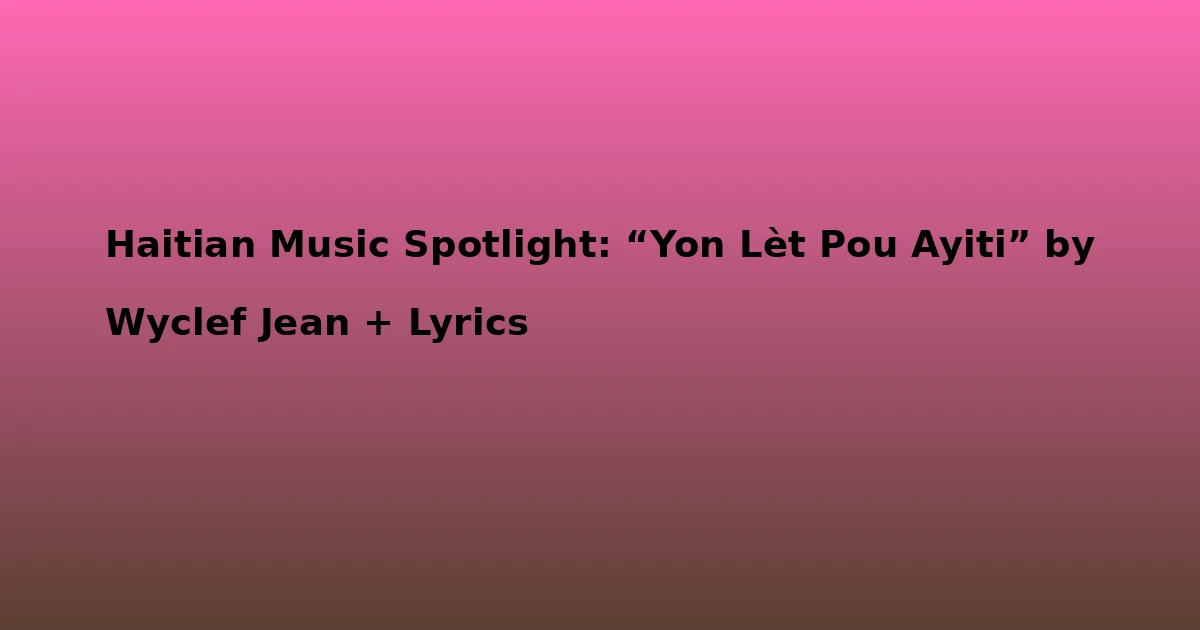Kreyolicious: The title of your memoir is rather imaginative. A Sky the Color of Chaos… You sit there, and you imagine a sky the color of gunpowder. Was this the first title that occurred to you?
It can be a challenge to find the perfect title for a book…something both smart and intriguing that truly captures the essence of the work.
People will happily tell you that a title idea stinks, that it’s a cliché, yet they won’t necessarily offer a better alternative. Titles are hard because they can kill a book. In the course of writing A Sky the Color of Chaos, I adopted at least fifteen working titles—from Inheritance to A Girl from Port-au-Prince to Child of My Father. They were all awful. In the end, the title came to me during my semester in Santa Cruz de la Sierra, Bolivia.
Downtown Santa Cruz carries a surprising resemblance to old Port-au-Prince, with its colonial architecture, its wooden porches, its balconies. Just like on Rue Pavée or Rue du Magasin de l’État, in Haiti, there was loud music emanating from car stereos and folks yelling at each other (albeit in Spanish) from across the street or down to the street from 19th Century windows, and streets were sometimes impassibly thick with throngs of people just milling about without regard for cars or buses. It was eerie. While on a taxi on Calle Sucre, I was transported back to Port-au-Prince and I pondered the contrast between the striking beauty of my birth city and the “pop up” violence there.
There is this scene in my memoir where I find myself in the wrong place at the wrong time. I’m in the middle of a crowd and there’s a shooting. I take cover behind a trash can and keep my eyes on the gorgeous blue of the sky.
An excerpt from the book reads, “I gagged at the stench from the waste; the ground was puke green. As I lay in the mud, I heard more screaming. I pulled my knees to my chest and wrapped my arms around my calves.
My entire body trembled. But in the midst of this, the sky remained a beautiful blue.”
Thinking about that scene, many strong titles occurred to me. The next day, my writing students at the International University helped me narrow down the list.
Kreyolicious: That’s such a lovely, poetically-described scene…In the book, you write about your father, in particular his flaws…Was that hard to do?
I’ve been thinking a lot recently about how much of my father always slips into my fiction. If I look back on any of my novels—there he is. I’m yearning for his love in Le Feu de la Vengeance (The Fire of Vengeance).
I resent his anger in La Bête (The Beast). I wish to run away from him in Les Hommes en Rouge (The Men in Red). I don’t do this on purpose and usually I don’t even recognize it until the writing is complete and there is distance between myself and the work.
My father has always fascinated me. He was such an interesting, complex, larger-than-life character.
In nonfiction, the portrayal of such a multi-faceted individual was challenging. I had a love-hate relationship with Papa. It would have been so easy to play the victim and turn the memoir into a pity party, but after my father died, I wanted A Sky the Color of Chaos to have the ring of testament, the sound and feel and grip of a book that was born from truth. I wanted the reader to understand the intricacies of daughterly love.
I don’t think that I overly focused on Papa’s flaws. Yes, my father had many shortcomings, but I also shared with the reader everything that made him a delightful human being: his loyalty to his friends, his sense of humor, his hard work. Getting the essence of an individual and putting it on paper, that’s never easy.
I had to grow both as a writer and as an individual to write this story. Rise above the violence and the hurt and the acrimony to find the humanity in my father. He was just a man, after all.
Kreyolicious: There aren’t many books in English written by someone from Haiti about the period you write about (the 1990’s and early 2000’s). Did you feel like a pioneer of sorts?
While fact-checking A Sky the Color of Chaos and conducting some research for my footnotes, I discovered a plethora of news articles about Haiti in the 1990s. Journalists Kathie Klarreich and Michael Tarr were instrumental in directing me towards useful reports.
There aren’t many literary pieces in English about this time period, however, and certainly no memoir that I know of, which is unfortunate because the Nineties constitute such an important chapter in Haitian history. The Duvalier era is over. The people get a shot at building a democracy, but the country, once again, falls apart.
During the late 1980s and 90s, from when I was eight-years-old to eighteen, Haiti’s government changed forms eight times. The Haitian people endured fraudulent elections, three military coups, a crippling embargo, and a United Nations occupation. I do feel like a pioneer.
I consider A Sky the Color of Chaos the first historical memoir about this era. I wrote the book not only to tell my own story, but also to document the story of my time. I was very careful with factual accuracy and chronology, using quotes from newspapers, letters and other verifiable, external records in my footnotes to make this memoir authentic.
Because of their unemotional nature, news articles do not fully capture the impact of political instability and the 1990’s embargo on the every day life of people in Haiti. Children are reported dying but no one describes the piles of bodies at the morgue. (“They were in such a state of decay, they were barely recognizable as humans. Masses of rotting flesh, greenish black.”) News articles might mention the many days when students couldn’t go to school because of tires burning downtown or a new gas shortage, but they are silent as to what these children are up to when left unsupervised.
The journalist writes about the many hours spent in lines at gas stations; the memoirist describes the sun toasting the drivers’ bodies, the tempers flaring, the gas station attendant being knifed by an impatient customer. I remember so many nights spent studying in candlelight. I remember many friends fleeing to the United States for a better life.
The son of a neighbor boarded a boat that sank at sea. Another became a gang member and robbed his girlfriend’s house. Those stories are more real to me than what was reported in the news. And people need to know those stories.
Kreyolicious: Once the book was printed, you probably read it all over again. In doing so, did you wish you could take some of it back? Whenever a writer gets personal, doesn’t the vulnerability factor kick in?
Throughout the years, I’ve shared many excerpts of the book online, on the Nervous Breakdown and other literary magazines, including Tupelo Quarterly, The Caribbean Writer, and The Southeast Review. Fictionalized chapters appeared in Haiti Noir (edited by Edwidge Danticat) and The Mom Egg. The process of letting go was therefore very progressive.
Before the release of the memoir, my personal life was already “out there” for anyone to put under the microscope and judge. I did many nonfiction readings in South Florida (at the NSU Art Museum, at Books & Books, at the Miami Book Fair, and so on) so that I practiced getting over my vulnerability.
My publisher (Matt Peters) and I worked on a series of six formatted proofs before I signed the final consent for the publication of A Sky the Color of Chaos. A month or so before the book came out, I decided to change almost all the names (to “protect the innocent”). At the last minute, I wanted to get rid of the only sex scene in the book (which I did).
Then there was my week-long crusade against all curse words, so that the book could be adopted by the public school system. Matt (who is a very patient man and trusts my judgment) had to say, ENOUGH. When I finally signed the release, I felt relieved. I’d been holding on to this book for way too long—eight years!
I haven’t read the book since it’s been available in print. I double-checked the format and page numbers to make sure there were no obvious misprints, but that’s it. I’m ready for the next project. The memoir is done.
Kreyolicious: You were part of the Miami International Book Fair [last year]. How did you enjoy that experience?
I made many appearances at the book fair. I had a blast!
On the Saturday [of the fair], I was part of a Haiti-focused panel titled “Land of Upheaval: A Literary Journey through Haiti’s Modern History.” With moderator Hector Duarte Jr., Fabienne Josaphat, Katia D.
Ulysse, and I discussed Haiti’s recent history, viewed through the prism of literature — from the days of Papa Doc Duvalier, to the tumultuous reign of President Aristide, to the earthquake that displaced more than 1.5 million people. (In March of next year, Hector, Fabienne, Katia, and I are traveling to Los Angeles, California, to present this panel at AWP!)
In the afternoon, I was invited by Wordier Than Thou to share at The Swamp a poem about what drew me to South Florida. Later on, I joined Mutsuki Mockett, Nikki Moustaki, and Suki Kim for “The World Over: Memoirs of Place.” All day, I was surrounded by greatness. It’s exhilarating!
On Sunday, I was one of the authors featured at Sunday Salon with Orange Island Art Foundation. I also had the honor of moderating “EXPATS! Haitian Women Poets in Exile: A Trilingual Reading in English, French, and Haitian Creole.” Three women from Haiti read and discussed poems that examine the physical, sociopolitical, canonical, and psychological kinds of exile endured by women writers of Haitian Descent.
Poets Rebecca N. Carmant, Angie Bell, and Naomiel (in conversation with me) probed the complex issues of race, nationality, gender, sexuality, and class that limit (or enrich!) their lives as expats.
Kreyolicious: Are you already tackling a novel?
I am! It’s a collaborative work with two awesome individuals: a talented fiction writer from Chile and a gifted Irish-American artist. That’s all I’ll say for now.
Details later. I don’t want to jinx it.
Last Updated on December 4, 2025 by kreyolicious



